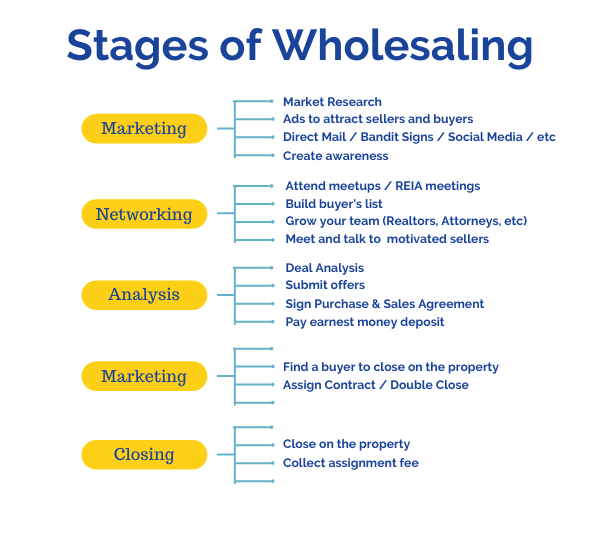
What is Real Estate Investing?
Real estate investing is a real estate wholesaling step by step popular way to generate income . Real estate investors acquire, hold, and flip properties to create financial stability. This guide details what it means to be a real estate investor, covering different types of real estate investments, ways to succeed, and potential challenges.
Types of Real Estate Investments
1. Investing in Residential Properties
- Single-Family Homes: Homes intended for individual families. These are common among first-time investors due to their manageable investment size and easier management .
- Multi-Family Properties: Buildings with multiple units, such as duplexes, triplexes, and apartment complexes. They offer higher rental income but demand greater management effort.
- Vacation Rentals: Properties rented out to short-term tenants, often through platforms like Airbnb or Vrbo. These can generate higher income but may have inconsistent occupancy and require active management .
2. Commercial Real Estate
- Office Buildings: Spaces leased to businesses for office use. They often have long-term leases , providing steady income .
- Retail Properties: Buildings leased to retail businesses, such as shopping centers, malls, and storefronts. Success is dependent on tenant profitability.
- Industrial Properties: how to wholesale a property Facilities used for manufacturing and storage. These have extended contracts and minimal management requirements .
3. Industrial Real Estate
- Warehouses: Buildings for storing products and supplies. Demand is increased by the rise in e-commerce.
- Manufacturing Facilities: Properties where products are manufactured. These demand specific expertise for investment.
- Distribution Centers: Hubs for logistics and transportation. Crucial for efficient supply chains .
4. Investing in Land
- Undeveloped Land: Vacant plots awaiting development. It offers speculative investment opportunities but can be risky .
- Developed Land: Land that has been prepared for construction, such as subdivided plots. Requires substantial funds and expert knowledge .
- Agricultural Land: Land dedicated to farming and livestock. Offers consistent profitability but requires understanding of agricultural trends.
Real Estate Investment Strategies
1. Buy and Hold
- Overview: Buy real estate to rent and keep for an extended period to gain from rent and value increase.
- Pros: Steady cash flow, potential tax benefits, long-term appreciation.
- Cons: Requires property management, tied-up capital, market risk.
2. Fix and Flip
- Overview: Buy properties at a discount, renovate them, and sell them at a higher price.
- Pros: Potential for high short-term profits, ability to improve property value.
- Cons: High risk, requires construction knowledge, market timing crucial.
3. Wholesaling
- Overview: Find discounted properties, secure them under contract, and assign the contract to another buyer for a fee.
- Pros: Low-cost entry, swift transactions, minimal management.
- Cons: Dependent on finding deals and buyers, smaller profits.
4. REITs (Real Estate Investment Trusts)
- Overview: Buy shares in companies that manage income-generating properties.
- Pros: Liquid investment, diversified portfolio, passive earnings, managed professionally.
- Cons: Volatile markets, limited investor control, management fees.
5. Real Estate Crowdfunding
- Overview: Pool money with other investors to fund real estate projects. Platforms like Fundrise and RealtyMogul facilitate this.
- Pros: Affordable entry, diverse investments, involvement in significant projects.
- Cons: Reduced control over investment, platform costs, potential risks.
Steps to Becoming a Real Estate Investor
Education and Research:
Learn the Basics: Understand real estate markets, financing options, property management, and investment strategies.
Networking: Join real estate investment groups, attend seminars, and connect with experienced investors.
Set Investment Goals:
Define Objectives: Set clear goals for your investments, whether for income, appreciation, or diversification.
Set Investment Goals
- Define Objectives: Determine your investment goals, such as income generation, capital appreciation, or portfolio diversification.
- Risk Tolerance: Assess your risk tolerance and choose investment strategies that align with it.
Develop a Business Plan
- Market Analysis: Research target markets, property types, and potential investment returns.
- Financing Strategy: Plan your financing, including mortgages, private loans, and personal savings.
Build a Team
- Key Professionals: Include real estate agents, attorneys, accountants, property managers, and contractors.
- Networking: Maintain and grow your network of helpful professionals.
Start Small
- Initial Investment: Invest in smaller properties or easier projects initially.
- Learn and Adapt: Learn from your initial investments and adjust your strategies accordingly.
Scale Up
- Growth: Gradually increase the size and complexity of your investments as you gain experience and confidence.
- Diversification: Broaden your investment portfolio with varied properties and areas.
Challenges and Risks in Real Estate Investing | Potential Challenges and Risks
1. Market Volatility
- Economic Factors: Economic shifts, interest rates, and policies can affect real estate markets.
- Mitigation: Keep up with market trends and adapt your strategies.
2. Property Management
- Tenant Issues: Managing tenant issues, vacancies, and rent collection requires effort.
- Solutions: Consider hiring a management company or enhancing your management skills.
3. Financing and Cash Flow
- Funding Challenges: Getting funding and managing cash flow can be challenging.
- Strategies: Have a solid financing plan and maintain a reserve fund for unexpected expenses.
4. Legal and Regulatory Issues
- Compliance: Make sure your investments adhere to legal requirements.
- Advice: Work with legal experts to understand and follow regulations.
Final Thoughts
Real estate investing is a dynamic way to grow wealth and meet financial objectives. By exploring different investment options, developing a strong strategy, and being prepared for challenges , you can thrive as a real estate investor . Whether you are a new investor or seasoned pro , ongoing education and flexibility are key to achieving long-term success .